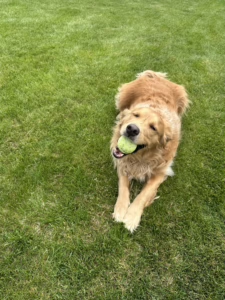You might notice your dog sleeping more, slowing down, or changing their habits in subtle ways. These little shifts are part of aging, and with the right care, senior dogs can thrive well into their golden years.
When your dog begins to age, their needs change significantly. As a pet owner, it’s your responsibility to ensure that your dog’s golden years remain comfortable and healthy.
This guide covers all you need to know when it comes to caring for your elderly dog. From the average life expectancy to identifying potential health concerns, you can ensure that your older dog has the comfort and necessary treatment they need.
What Is Considered a Senior Dog?
Dogs age differently depending on size and breed. According to the American Veterinary Medical Association:
- Small breeds (under 20 lbs): 8–11 years
- Medium breeds (20–50 lbs): 8–10 years
- Large breeds (50–90 lbs): 8–9 years
- Giant breeds (90+ lbs): 6–7 years
Signs of aging include a graying muzzle, slower movement, or changes in appetite and sleep. Even if your dog still acts spry, once they reach these ages it’s time to pay closer attention to their health.
Common Health Problems in Senior Dogs
Just like humans, elderly dogs are more prone to certain health conditions. The most common health issues include:
- Arthritis and joint pain: You may notice stiffness, limping, or reluctance to jump or climb stairs. Thankfully, modern treatments can help, with pain management options like Librela, whichcan ease the effects of arthritis pain.
- Cancer: Nearly half of dogs over age 10 will develop some form of cancer, according to the Veterinary Cancer Society. Warning signs include unexpected lumps or bumps, sores that don’t heal, weight loss, or changes in appetite.
- Chronic diseases: Diabetes, kidney disease, heart disease, and liver disease are more common in senior dogs. Thankfully, regular bloodwork can catch these conditions early.
- Dental disease: Painful gums, loose teeth, or difficulty eating can affect your dog’s whole-body health.
- Vision and hearing loss: Cataracts, cloudiness, or reduced response to voice commands are normal changes.
Weight Management in Senior Dogs
When dogs get older, what they eat matters even more.
Extra pounds can cause many health problems in your older dog such as joint disease, pancreatitis, heart disease, or kidney failure. Updated research shows the lifespan of overweight dogs can be up to 2 1/2 years shorter, on average, compared to dogs with a healthy body weight.
Tips for managing weight in senior dogs:
- Choose a senior dog food designed to provide proper nutrients without excessive calories.
- Measure meals instead of free-feeding.
- Limit treats to no more than 10% of daily calories.
- Encourage gentle activity, such as short walks, light play, or swimming if your dog enjoys water.
It’s always best to consult your veterinarian about weight management and food choices for your senior dog. They can tell you what’s best for your dog’s age and health.
Behavior and Cognitive Changes in Senior Dogs
Similar to dementia in people, canine cognitive dysfunction (CCD), also known as cognitive dysfunction syndrome (CDS), is more common in elderly dogs.
Common behavior changes in senior dogs with cognitive dysfunction include:
- Increased anxiety or barking
- Increased aggressive/protective behavior
- Acting disoriented or confused in familiar places
- Restlessness or pacing at night
- House-soiling accidents
- Changes in sleep patterns
- Decreased response to voice commands
- Decreased interest in toys, play, or family interaction
If you notice these changes, talk to your veterinarian. Certain diets, medications, supplements, or enrichment activities may help slow progression and improve quality of life. A trusted veterinarian can recommend which ones might be right for your dog.
Learn more from the AVMA.
Preventive Care and Vet Visits
Regular veterinary visits are crucial for early detection in age-related issues like periodontal disease, diabetes, arthritis, or liver disease. As with every stage of life, senior dogs should be seen by a veterinarian every six months.
At these visits, your veterinarian should perform a comprehensive nose-to-tail examination, potentially including bloodwork and urinalysis to check organ function. They should also look for other conditions that occur with senior cats by reviewing their diet, mobility, weight concerns, dental hygiene, behavioral changes, vaccine schedules, and other health conditions with you.
Dental Care for Older Dogs
Older dogs are more likely to contract dental disease since their dental health declines with age.
Dental disease can progress quickly and cause a lot of pain and discomfort for your pet. It also can lead to issues like gum disease and tooth loss, and neglected dental problems can lead to infections, chronic health conditions and complications. For senior dogs especially, at-home oral care,or professional dental cleanings are integral to their overall health and wellbeing.
Pet Dental Cleanings: What You Need to Know
Approved products by the Veterinary Oral Health Council
The Hard Goodbye: Knowing When It’s Time
Sometimes, you just “know” the right time. But often, pet parents struggle to find the middle ground between giving up early and waiting too long.
As a guide to this decision, we recommend scheduling a Quality of Life Assessment with one of our vets. We’ll meet your dog and objectively help you with decision-making guidance. We treat these appointments with extra compassion because we understand this is not an intuitive decision for most pet parents.
At ReadiVet, we walk with families through this stage with:
- Quality of Life Assessments to guide decision-making
- Hospice (“pawspice”) and pain management plans for care and comfort at home
- At-home euthanasia, so your dog can pass surrounded by familiarity and love
- Private and communal cremation services coordinated respectfully on your behalf
Helping Senior Dogs Live Their Best Years
As veterinarians often say, “Old age isn’t a disease.” There are many things that can be done to manage medical conditions, eliminate or reduce pain, and help senior dogs enjoy their golden years to the fullest.
At ReadiVet, we’re honored to walk alongside you through every stage of your dog’s life, whether that means their first vet visit, preventive care, pain management, or compassionate end-of-life support. And because we come to you, your dog always receives care where they feel most comfortable: at home.
Questions about your senior dog’s health or concerns about a potential medical problem? Schedule a senior wellness visit with ReadiVet today in Dallas or Nashville.




